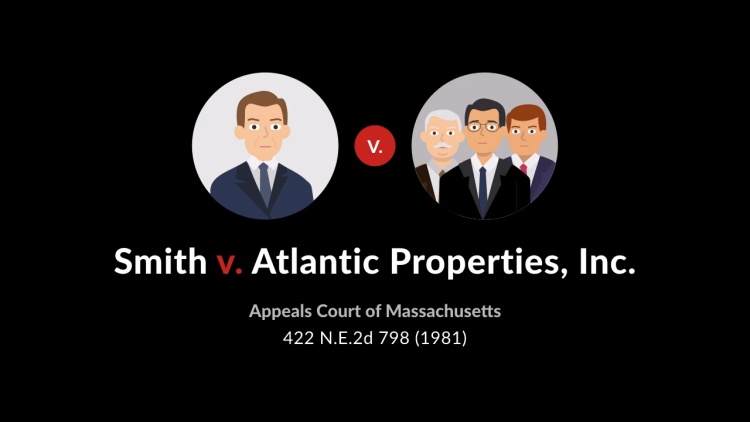Smith v. Atlantic Properties, Inc.
Massachusetts Appeals Court
12 Mass. App. Ct. 201, 422 N.E.2d 798 (1981)

- Written by Sean Carroll, JD
Facts
Louis Wolfson (defendant), Paul Smith, Abraham Zimble, and William Burke (plaintiffs) each owned 25 percent of the outstanding shares of Atlantic Properties, Inc. (Atlantic). Atlantic’s bylaws stated that no corporate action could be taken without an affirmative vote of 80 percent of the outstanding stock. This provision effectively meant that any decision could be vetoed by one of the four partners. When Atlantic began to turn a profit, Smith, Zimble, and Burke wanted to declare dividends. Wolfson, however, repeatedly voted against declaring dividends, instead wanting to devote the funds to repairs on the property. Smith, Zimble, and Burke agreed to devote a moderate amount of the funds to repairs but maintained that declaring dividends was the correct approach. Eventually, Atlantic accumulated so much profit that it was in excess of the Internal Revenue Service (IRS) limits, which provided that at a certain point of profit, corporations must declare dividends. Wolfson still refused to vote in favor of declaring dividends, and because of the 80-percent provision, Atlantic was not able to do so. The IRS accordingly assessed penalties against Atlantic for seven straight years, with Wolfson still refusing to give in. After about four years of the IRS penalties, Smith, Zimble, and Burke brought suit, seeking reimbursement to Atlantic from Wolfson for the IRS penalties. The Massachusetts Superior Court found in favor of Smith, Zimble, and Burke, holding that Wolfson’s actions were based in part on a desire to avoid tax payments and that Wolfson failed to present a definite program for repairs that would satisfy an IRS inquiry into the dividend matter. Wolfson appealed.
Rule of Law
Issue
Holding and Reasoning (Cutter, J.)
What to do next…
Here's why 907,000 law students have relied on our case briefs:
- Written by law professors and practitioners, not other law students. 47,100 briefs, keyed to 996 casebooks. Top-notch customer support.
- The right amount of information, includes the facts, issues, rule of law, holding and reasoning, and any concurrences and dissents.
- Access in your classes, works on your mobile and tablet. Massive library of related video lessons and high quality multiple-choice questions.
- Easy to use, uniform format for every case brief. Written in plain English, not in legalese. Our briefs summarize and simplify; they don’t just repeat the court’s language.





